Bereaved mums want people to remember their lost children are still just as much a part of their family of their living ones
MOTHER’S Day can be a difficult and isolating time for women who have experienced stillbirth or miscarriage. Survivors share their stories and say the children they lost are still just as much a part of their families as the ‘rainbow babies’ who followed them.
VIC News
Don't miss out on the headlines from VIC News. Followed categories will be added to My News.
For the first six weeks, Anna Weiss often found herself lying in bed, staring at the wall.
In fact, for the first two months after the loss of her baby Azriel at 23 weeks’ gestation she could barely leave her bedroom.
“It took me months to get any sort of meaningful routine back into my life,” Weiss says.
There were times throughout the first year where she “felt like I was living in a dream, completely lost”.
Due to catastrophic damage to his organs because of a virus caught in pregnancy, Azriel was born disastrously premature.
His mother wears a chain with two pretty silver discs and a little sterling heart. The discs are engraved with the names Ethan and Evie, the heart bears the simple letter A.
It was a Mother’s Day gift from Weiss’s husband Andrew, who has walked the fraught path to parenthood with Weiss and shared her pain.
“Azriel is as much one of my babies as Ethan and Evie, but I think it’s quite good the way it is with just the initial, because sometimes you might not want to talk about it when people say, ‘Oh, they’re your kids’ names … Oh, hold on who’s that one?’ ” Weiss says, as Ethan, 8, and Evie, 4, play nearby.
This way Weiss, 36, can avoid telling her story in moments when, even after six years, her grief may surprise her. Usually, though, this mother of two children from five pregnancies is happy to be asked about her losses and wants to get the message out that it’s time to break the taboo.
Though having a subsequent baby never replaces a baby who has not survived, Weiss says the arrival of two babies safely brought joy back into her life.
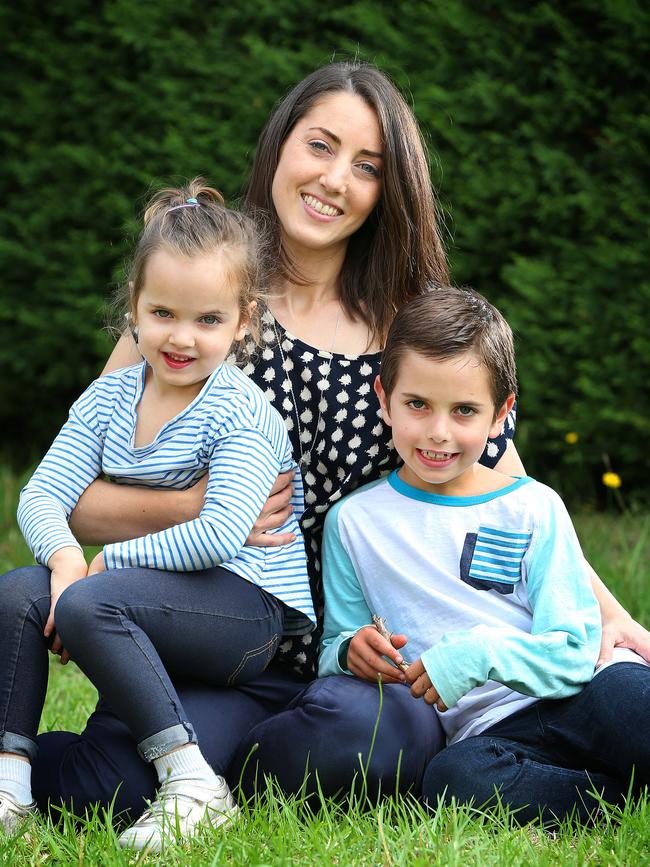
“It was a tremendous relief, it felt like another piece in the cycle of healing was complete,” she says.
Having another child “brought a lot of joy back into my life and helped to fill part of that hole in my heart; but it doesn’t take away from the fact that we had another child we no longer have”.
Weiss and mothers like her who have spoken to Weekend want people to know they are not just OK with talking about babies they have lost due to miscarriage, stillbirth or death soon after birth, they feel less isolated if you ask.
Lyndy Bowden is chair of Sands Australia, which helps parents who have suffered miscarriage, stillbirth and newborn deaths. She says while nothing will completely heal the pain and sorrow, over time it does become more bearable.
Hearing from other bereaved families who are further along their grief journey may provide hope and comfort, she says.
As one in four confirmed pregnancies in Australia is estimated to end in miscarriage before 20 weeks and seven babies a day are lost to stillbirth — foetal death after 20 weeks — or death in the first month post-birth, many women around you will have suffered this kind of crushing loss. Yet as Weiss points out, people shy away from acknowledging it.
Fear of saying the wrong thing can put them off raising what has happened when, according to Weiss, saying nothing about that baby may make mothers feel worse.
“Often people don’t realise that from 16 or 17 weeks a baby that’s born looks like a baby, just very little,” says Weiss, who worked in disability services before retraining as a midwife.
“I don’t think the general public understand that our son was born, we held him. He had 10 fingers and 10 toes and a perfect little body, perfect, just tiny.
“And I think that’s something people can’t get their heads around. In general, people struggle with what to say.
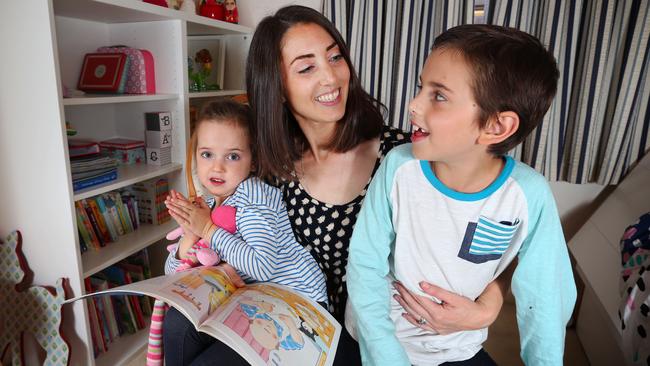
“Pregnancy loss is isolating, really, really isolating; you feel very alone, like your whole world has changed but nobody else around you has changed. They’re just going on with their lives while you are stuck in this spot.
“You should be pregnant and you should have your baby and you’re planning your maternity leave and your future with this baby and that gets taken away from you.
“You just feel really, really alone.”
Of the lasting impacts mothers feel after losing a baby mid-pregnancy, guilt about their body “failing” to protect the baby and feelings of dread and anxiety during subsequent pregnancies are among the most pronounced.
Weiss convenes meetings for bereaved mothers attending support groups run by Sands Australia and says that though women realise holding onto guilt is unnecessary “there’s nowhere else to put it”.
Mothers also mention how the “naivety” and innocence of pregnancy is damaged by such losses, as Weiss well understands, since she had one before she had Ethan and one after, on top of losing Azriel.
“It suddenly opens your eyes to this whole other world that you didn’t know existed,” she says. “And people start coming out of the woodwork and sharing their stories, and then you find out about the statistics — which is one in three first pregnancies and one in four miscarry overall — and you feel, ‘OK, now I’m part of that.’ ”
After two pregnancy losses, Weiss mistakenly concluded, “I’ve had my horrendous experience.”
She had never heard of the highly transmissible but usually silent disease cytomegalovirus, known as CMV, and when told at a 20-week ultrasound for Azriel that he had contracted it in the womb she was shocked to learn it could be damaging and potentially fatal.
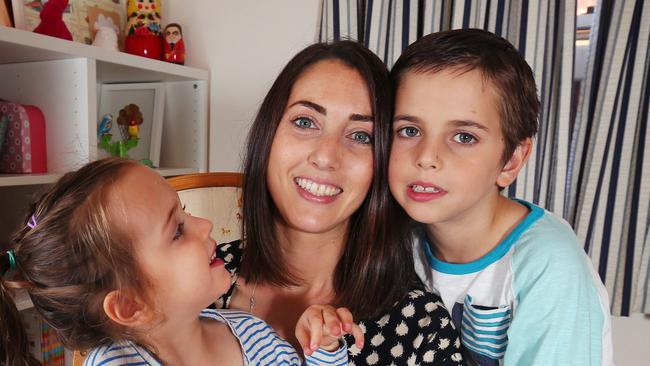
Even so, as someone working with people with disabilities, Weiss’s reaction to learning there was a strong chance her baby would have abnormalities was calm.
“I was absolutely fine with that; I knew I would be 100 per cent fine (raising a baby with a disability),” she says.
Two and a half weeks of “every test under the sun” followed the initial scan before the eventual, terrible diagnosis was delivered to Weiss that CMV had caused the worst possible issues with Azriel’s organs and even the placenta had begun to break down. Azriel was born, and died, not long after.
Women such as Weiss and Knoxfield mother Michelle Sal are part of a group no one wants to join but whose members understand innately what the others are going through.
For Sal, the 20-week scan — a time at which most expectant mothers who have that check get welcome news that everything is fine — was also a devastating turning point. Having conceived twins, Sal went into shockingly early labour early last year just five days after the halfway ultrasound found them healthy.
She had an emergency procedure doctors hoped would stop or delay the labour but a boy, Archer, was born around 21 weeks.
“He was alive for nine minutes,” Sal says.
Then 31, Sal was taken to the Monash Medical Centre, where doctors could observe her for possible complications for both the mother and surviving baby due to infection after Archer’s birth. She was put on “elevated bed rest”.
Tragically, she went into labour again at around 23 weeks and had a daughter, Stella. Stella was alive for three hours.
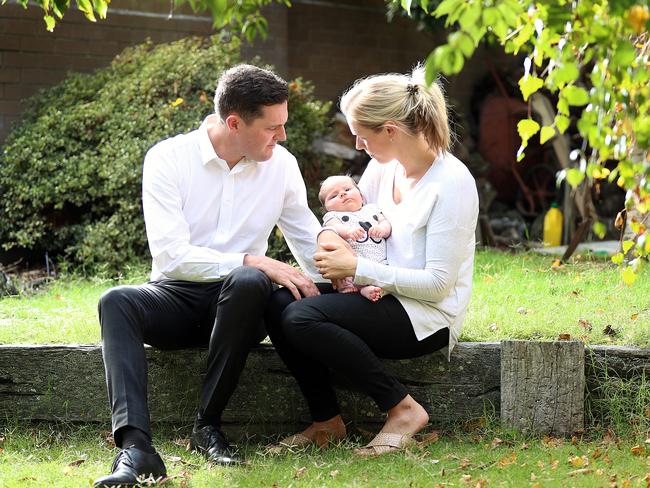
“My family met both of them, they came into the birthing suites and got to meet the twins, born 11 days apart,” Sal says.
She was told by a specialist later that her body is one of those that cannot handle carrying twins.
Like Weiss, Sal noticed people struggled to discuss the subject of their babies with her and husband Nic.
“It was the worst; we had people who would just say nothing,” she says. “And it was horrible because we were parents, we had babies we held and they were alive.
“For people to not (talk about) that just made it worse. We sent around a text a couple of weeks after and told people to speak about it and say their names, and not to think that was going to make us uncomfortable.”
They discovered such a lack of understanding around what parents who lose babies well into a pregnancy go through that Nic was asked, “God, did Michelle have to give birth?” Both mothers say this lack of recognition of parents’ experience makes it harder for male partners, too.
While Sal says she was lucky the struggle made her marriage stronger, “I could see how it could break you.”
Weiss says, “It’s very hard to be in the same point in the grief cycle at the same time as your partner; the partners do it really, really rough too.
“I think they feel the burden of making things OK and they can’t. And perhaps they (have to) delay their grief to try to support you, because it’s the woman who has gone through the physicality of it, you’re recovering from giving birth or still going through difficult trauma.”
The first anniversaries of the babies’ passing, on March 14 and 25 this year, were made more bearable by family sending flowers and friends sending texts saying they were thinking of Michelle, Nic, Archer, Stella and the couple’s new baby Matilda, born safe and well in February.
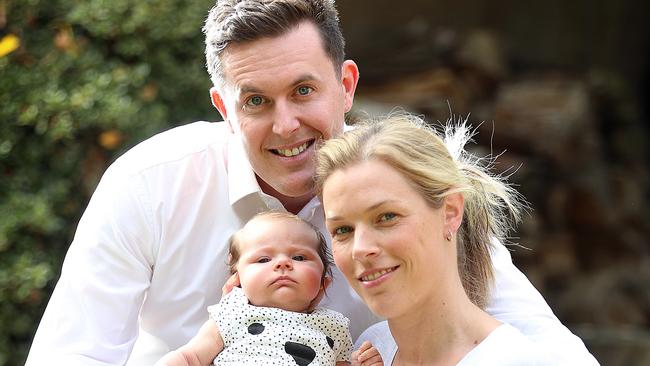
To mark the memory, the pair took Matilda for a picnic in a park near where they were married in Sorrento “and just remembered them, we think we’ll do that every year”.
Sal, like Weiss, says women who have lost babies need good support during subsequent pregnancies.
Despite being determined to try for another baby after she lost her twins, Sal says the next pregnancy was extremely difficult.
“There was no moment in the pregnancy where I could relax; I did think perhaps I could a bit once I passed 23 weeks that I would be fine — that’s the milestone for us, when Stella was delivered — and then after I reached 25 weeks when the babies could be born and survive, but it just got worse.
“Even at 30 and 34 weeks it (anxiety) was just getting worse, because for something to go wrong then, so close to the end, would almost be worse.”
Bowden says a common theme among mothers she is in contact with through Sands is that people around them “don’t understand how much pain and grief they’re feeling”, especially around miscarriage.
“Unfortunately there’s that belief that for a lot of people it’s not a baby (if it is not born alive) but to parents, that child is their baby, that’s their future, so the grief around that is still very traumatic,” Bowden says.
She lost a son 30 years ago, four days after his birth, due to severe heart problems, and has recently supported her daughter-in-law and son through the loss of their baby at around 27 weeks due to a very aggressive and untreatable cancer.
Bowden has 12 living children.
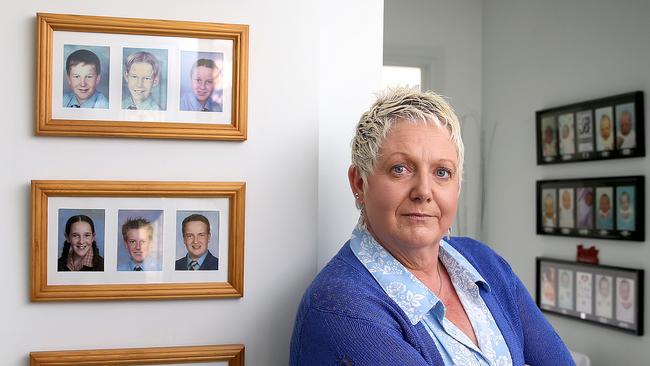
Even though Bowden is heavily involved in Sands, she was surprised when telling friends about her grandson’s loss that one revealed, “Yes, we had a baby die 10 years ago.”
“If you stop and talk to people about these things, it gives them permission to be able to talk about their own baby,” she says.
A common reaction from bereaved parents just starting to realise there is a support community of people who understand their experience is, “Oh, so I’m not going mad.”
“I always talk about how there’s no section of the baby book that says, ‘This is what you do if your baby dies, this is how you’ll feel’, there’s certainly a big gap.”
Social media is helping people find their way to support, she says, which helps reduce a sense of isolation, especially on days such as Mother’s Day.
Though some people have coined the term “rainbow baby” for babies conceived after the death of a baby sibling, having talked to women who have been through such dreadful loss it is impressive enough that they keep getting out of bed each day.
Weiss was so moved by the dedication of the Royal Women’s Hospital midwife who supported her through Azriel’s birth that she decided to retrain as a midwife.
The two women are now colleagues, the experienced midwife is Weiss’ mentor, and they are wonderful friends.
“There was a monumental connection and a seed that was planted,” Weiss says. “I felt, ‘I could do this’, especially now I’ve been through the most horrendous of scenarios — giving birth to a baby when you know that baby isn’t going to live. I thought, ‘I could do that for other women’.”
Rainbows or battering storms, they will be lucky to have her.
HELP IS AT SANDS
Sands provides support, information and education for anyone affected by the death of a baby before, during or shortly after birth.
Visit sands.org.au orsandsvic.org.au. To find a Sands group in Victoria, phone 9874 5400
or email admin@sands.org.au.


